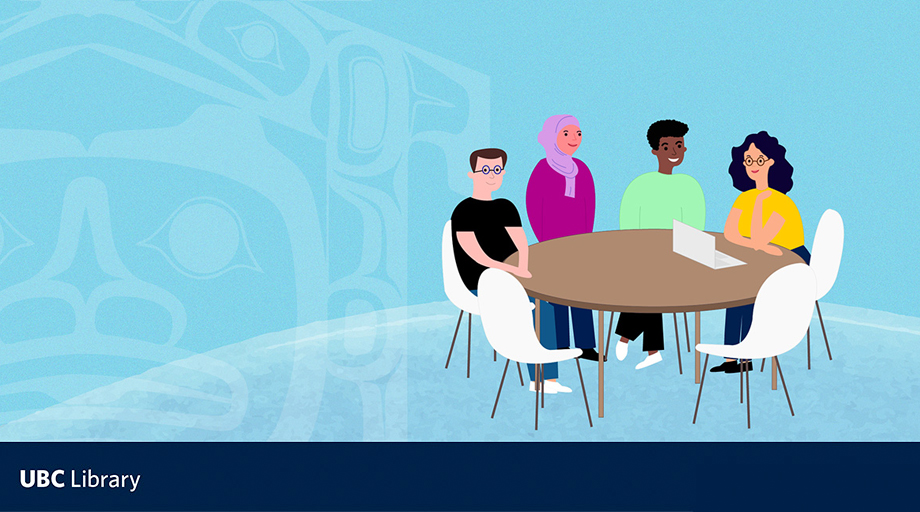
Imagine that you’re working at a library reference desk. A student hesitantly approaches you with a question. They are a nursing student who will be starting a community care plan assignment in Port Alberni. They need to find research on the local First Nation (Tseshaht), but don’t know what search terms to use. What would you tell them?
Another student is working on a paper for a 100-level engineering class and wants to include Indigenous perspectives into their sources. Where should they start?
These are two practice scenarios from Basic Indigenous Reference Training, a new type of workshop recently developed by UBC Library to address the growing demand from all disciplines to learn more about Indigenous topics in coursework and research.
X̱wi7x̱wa Library is a UBC Library branch, a centre for Indigenous scholarship and a leader in Indigenous academic librarianship. As the only Indigenous branch of an academic library in Canada, X̱wi7x̱wa Library is also uniquely placed when it comes to fielding questions about Indigenous topics.
Until recently, all reference questions about Indigenous materials or topics that would come into UBC Library branches would get referred to the small, expert team of librarians and staff at X̱wi7x̱wa Library.
“There has been a large push for any Indigenous research questions to always get referred to Xwi7xwa Library,” says Karleen Delaurier-Lyle, Information Services Librarian at Xwi7xwa Library. Over the years, the demand for Indigenous reference has grown considerably due to efforts across campus to Indigenize the curriculum at UBC—one of the stated goals in UBC’s Indigenous Strategic Plan—and to engage with Indigenous perspectives and Ways of Knowing.
“As you can imagine, folks are looking to participate in Truth and Reconciliation and the Indigenous Strategic Plan initiative. That has increased the number of people with questions,” says Delaurier-Lyle.
To address the growing demand and expand capacity for Indigenous reference help across the UBC Library system , UBC Library created a working group in March 2023, led by Alex Kuskowski, Learning Services Librarian at the Chapman Learning Commons in the Irving K. Barber Learning Centre. The group met regularly to discuss ways to provide training to UBC Library librarians and reference staff on ways to approach answering basic Indigenous reference questions. Three live training sessions were offered in the summer, attended by nearly 50 UBC Library employees, for whom this work directly intersected with their job duties.
“In order for UBC Library to deliver on commitments to Truth and Reconciliation and the Indigenous Strategic Plan, there is a need for increased capacity to do this kind of work throughout the system,” says Barbara Sobol, Technology Management Librarian at UBC Okanagan Library. “And that responsibility does not only rest with either Xwi7xwa Library or with our Indigenous colleagues who might be elsewhere within the system. It’s a broad, sweeping responsibility across the system. This reference training was designed to help build capacity for people providing various types of reference services, regardless of subject matter and across different roles.”
As part of their roles, academic librarians and library reference staff become familiar with many different specialized areas of knowledge and develop the skills needed to connect library patrons with the right resources in those areas. With Indigenous reference topics, there was a real hunger for this kind of training, says Claire Malek, Archivist at Rare Books and Special Collections.
“All libraries should be having this kind of conversation and doing this kind of training—this is so important,” says Malek.
Each workshop session included information on how to reference resources, tips for navigating difficult conversations, practice scenarios and breakout room discussions.
“I was really interested in the undocumented conversations that happened when we had the breakout rooms,” says Delaurier-Lyle. “I think that it took a lot of humility for people to sign up for the sessions, and then also the willingness to share in those rooms because it can be really daunting to not only share experiences, but share the things that we don’t know.”
Looking ahead, the group aims to continue its work, with new workshops to address the ongoing need for Indigenous reference skills at UBC Library. The first new workshop series is slated to roll out in March for student librarians and UBC iSchool students. For more information about this workshop, contact Ursula Ellis (ursula.ellis@ubc.ca) and Karleen Delaurier-Lyle (karleen.delaurier-lyle@ubc.ca).
This sounds fantastic- do you ever do training for universities other than UBC? Miigwech , Thank you – Nicole from Algoma University Wishart Library
Hi Nicole! At the moment, the training is only offered internally at UBC. But I’ve forwarded your question on to the working group so they can get in touch!
This does sound amazing! We would also be very interested in any opportunity to benefit from the training.
Thank you,
Rachel, University Library, University of Saskatchewan